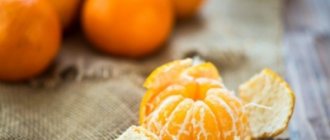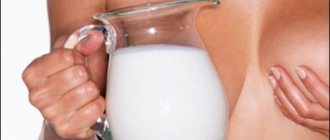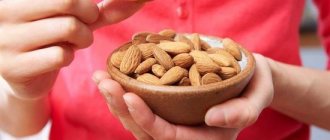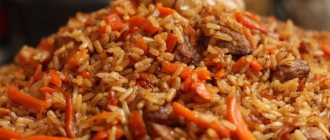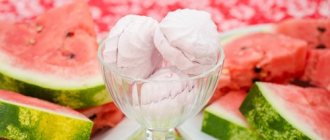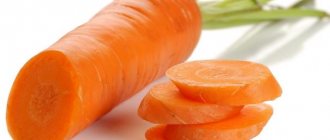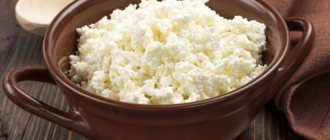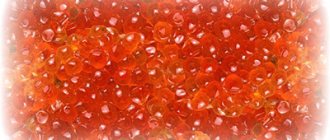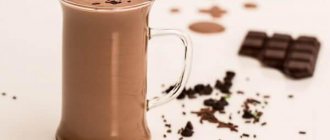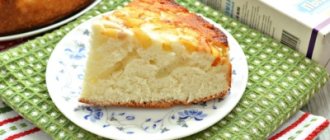Composition and benefits
There are many types of nuts. They differ in composition and beneficial properties. It is important for a woman to know which nuts are ok while breastfeeding and which ones should be avoided.
Walnuts
Walnuts have the ability to increase the fat content of breast milk. As a result, the child gains the desired weight faster. The product has a beneficial effect on the functioning of the myocardium. It contains iodine, so it is recommended for certain thyroid diseases.
Walnuts also contain vitamins B, A, PP, E, C, K1, iron, magnesium, sodium, potassium, and calcium.
Useful properties of the product:
- strengthening the immune system;
- cleansing the body of harmful substances;
- lifting your mood, getting rid of depression;
- relieving fatigue;
- normalization of the intestinal tract;
- improved sleep;
- activation of the brain;
- restoration of hormonal levels.
Cedar
Pine nuts have a high nutritional value and are easily digestible. They are a source of vitamin E. This element is responsible for the youth and beauty of the skin. The product also contains a lot of vitamins B, A, PP, E, sodium, magnesium, calcium, phosphorus, potassium, and selenium.
Pine nuts
Pine nuts have the following properties:
- acceleration of regeneration of the epidermis and mucous membrane;
- increasing the body's resistance to viruses;
- improving brain function;
- normalization of metabolic processes.
Sweet almond
Sweet almonds have high taste qualities. It is often used in the preparation of desserts. The product contains vitamins E, A, C and B. It contains sulfur, copper, manganese, zinc, and sodium.
This type of nut promotes normal growth and development of the baby, and also helps a woman recover faster after childbirth. Almonds have a beneficial effect on the functioning of many organs and systems. This nut makes breast milk more nutritious due to the presence of healthy fats.
Product properties:
- reduction of bad cholesterol levels;
- improvement of the condition of the epidermis and hair;
- normalization of blood pressure;
- increased visual acuity;
- stabilization of myocardial function;
- elimination of heartburn;
- memory improvement;
- activation of brain function;
- preventing the degeneration of healthy cells into cancerous ones;
- relieving psycho-emotional tension and stress.
Peanuts and hazelnuts are dangerous for babies. These varieties are highly allergenic. Safer for infants are cashews, pine nuts, walnuts, pistachios and almonds.
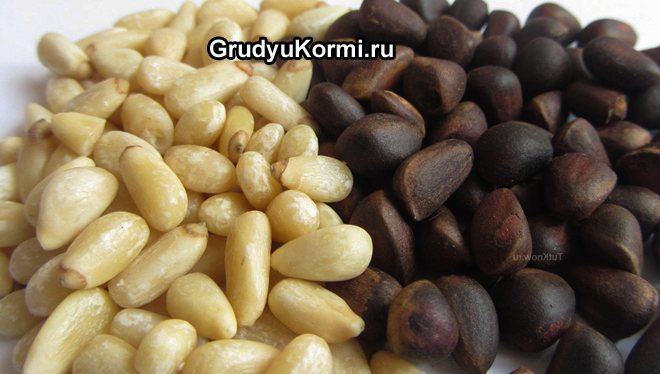
Cashews contain vitamins B, K, E, A, biotin, iodine, phosphorus, potassium and other useful substances. The product has antibacterial properties. The amino acids that make up cashews have a beneficial effect on the functioning of the nervous system of mother and child.
Useful properties of the nut:
- lowering cholesterol levels;
- improvement of the condition of arterioles and myocardium;
- prevention of anemia;
- toning the body;
- strengthening bones;
- normalization of protein metabolism;
- improving the quality of vision.
Pistachios
Pistachios contain vitamins B and E. Minerals in the product include magnesium, phosphorus, calcium, potassium, iron, sodium, and iodine. These elements determine the presence of a number of useful qualities.
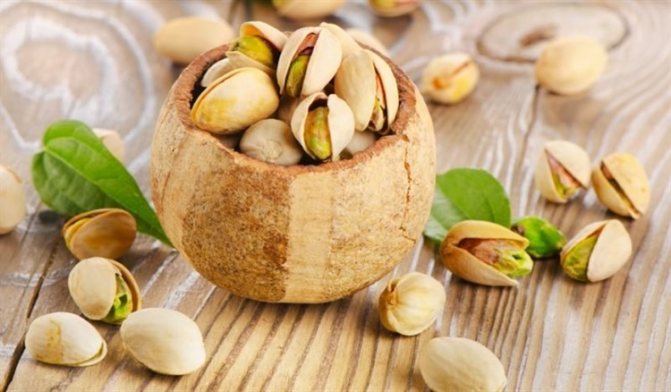
Pistachios
Pistachios have the following effects on the body:
- help fight stress;
- lift your spirits;
- normalize blood pressure;
- strengthen the immune system;
- improve liver function;
- reduce cholesterol concentrations.
Allowed nuts can be eaten in moderation during lactation. The nutritious product is suitable as a light snack, and its benefits for a tired and weakened nursing woman are invaluable:
- In terms of vitamin C content, nut kernels have left even black currants and citrus fruits far behind. Nuts strengthen the immune system, improve mood and serve as an excellent prevention of colds.
- Thanks to B vitamins, the sedative effect of nuts is noticeable - a woman’s nervous system works normally.
- The heart muscle and blood vessel walls are strengthened.
- Excess fluid and waste are removed from the body.
- The female body is enriched with oxygen, which relieves fatigue and prevents depression from developing.
- A large amount of protein allows you to quickly fill up and restore strength.
- Tannins have a beneficial effect on the gastrointestinal tract.
- Such an important element as iron is the best prevention of anemia.

Easily digestible fats and low carbohydrate content help quickly restore your figure after childbirth.
Common nuts contain many components that have a positive effect on the child’s body.
The nuts contain:
- vitamins (A, PP, E, K, B);
- magnesium;
- phosphorus;
- zinc;
- potassium;
- iodine;
- juglone;
- amino acids;
- polyunsaturated fatty acids;
- proteins.
This valuable composition makes nuts a unique and healthy product, but its consumption during breastfeeding is allowed only with certain restrictions.
Attention! Moderate consumption of nuts during breastfeeding allows you to restore the mother’s immune system, weakened during pregnancy, and increase the child’s resistance to various ailments.
You should pay attention to the impressive list of positive qualities of the product:
- Nuts contain juglone, a phytoncide with pronounced antibacterial properties.
- Helps eliminate headaches due to its vasoconstrictor effect.
- Thanks to the increased concentration of vitamin C in the composition, it improves your mood.
- The component helps in the fight against iron deficiency anemia due to its own unique composition.
- To normalize urinary processes, doctors recommend that women consume 1 kernel of nuts on an empty stomach.
- Nuts help improve the quality of milk by increasing its fat content.
Many women are convinced that nut kernels have a positive effect on the female body during lactation, however, there are other factors that recommend treating the product with increased caution.
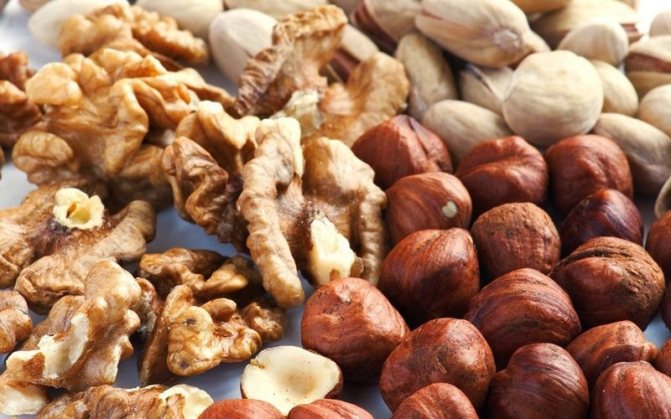
Walnuts are an extremely high-calorie product; 100 grams of nuts contain 656 kcal and 547 of them are derived from fats. However, they are completely free of carbohydrates, so it is impossible to ruin your figure by eating a measured amount of nuts.
The positive effect of the product during breastfeeding is its ability to saturate women's milk with all the beneficial elements contained in the composition.
It is necessary to pay attention to the fact that the components that make up the nuts have a positive effect on the child’s central nervous system, providing a sedative effect. The list of products that have a sedative effect includes:
- carotenoids;
- essential oil;
- tanning components.
Walnuts, which are quite common in Russian latitudes, contain a powerful dose of vitamin C, therefore, the product can be useful during colds, because it is a natural antiviral agent.
We cannot ignore the fact that walnuts act as a serious allergen due to the high percentage of essential oils in their composition. That is why any nuts should be introduced into the mother’s diet with caution, starting with 1 kernel per day. In this case, you should monitor the child’s reaction; the appearance of a rash of unknown origin on any part of the body is a good reason to refuse the product.
It is necessary to pay attention to the fact that the allergen can accumulate in the child’s body for several days and even months, so the reaction may appear only after a certain period of time. Mothers whose children are allergic should avoid eating nuts completely.
Cedar kernels have great nutritional value. They are easily absorbed by the body and have an anti-inflammatory effect. Nuts contain unsaturated fatty acids, vitamins, potassium, iodine, iron, phosphorus and magnesium.
Pine nut kernels help improve the general condition of the body and the well-being of a nursing woman. In addition, nuts contribute to:
- getting rid of skin lesions (acne, psoriasis, eczema);
- strengthening hair and nails;
- cleansing the liver of toxins;
- prevention of cardiovascular diseases;
- prevention of varicose veins;
- improving memory;
- strengthening the immune system.
Pine nuts help improve performance and give a young mother a boost of energy and vigor for the whole day.
This product, like meat, contains a large amount of protein. If a woman is a vegetarian, then pine nut kernels will help compensate for the lack of this substance in the body.
Nuts while breastfeeding
Women need fats, especially during lactation, when nutrients are partially spent on milk production. It is nuts that contain healthy fats - Omega-3 unsaturated fatty acids, which are necessary for brain function, maintaining heart health, and getting rid of bad cholesterol. Each type of fruit has its own vitamin and mineral benefits. Like any product, even a very healthy one, nuts can be harmful if consumed in large quantities.
Nuts are highly allergenic and often top the lists of foods contraindicated during breastfeeding. Peanuts and hazelnuts are considered especially dangerous, but any other types can also cause allergies. Moreover, since ancient times, these fruits have been used to stimulate lactation and improve the fat content and quality of breast milk. In particular, walnuts are most in demand among nursing mothers.
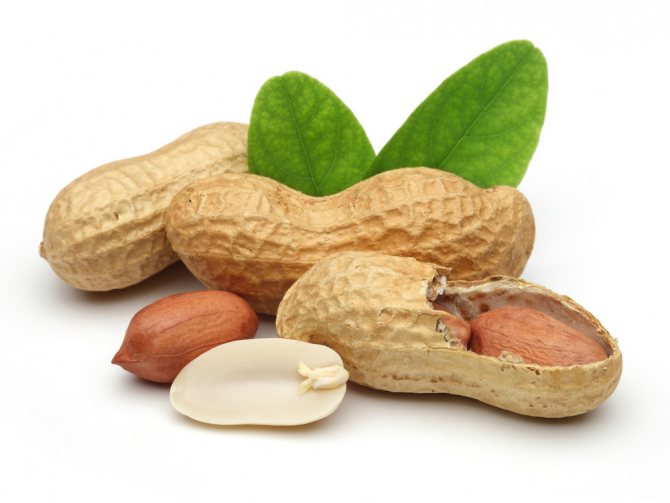
Peanuts are considered one of the heaviest and most allergenic foods.
The main feature of the product is the high concentration of micronutrients, this becomes their advantage and disadvantage at the same time when it comes to the period of breastfeeding. On the one hand, there is the risk of allergies, on the other, the opportunity to enrich the composition of milk. It is recommended to stick to the golden mean and take a reasonable approach to including these foods in your diet. If the mother ate nuts during pregnancy and does not suffer from allergies, you can introduce them to the menu, but very carefully, starting with a minimum amount, monitoring the baby’s reaction.
It is widely believed that walnuts cause milk flow. In fact, they affect its composition - they make it more caloric and nutritious, ensuring a long-term feeling of fullness for the baby. Nuts do not have an effect on the ducts of the mammary glands and cannot provoke lactostasis or mastitis.
Nuts allowed for a nursing mother
Nuts of any kind can cause allergies in a mother or baby, but some of them are well digestible and provoke unwanted reactions less often than other varieties. Conditionally permitted during breastfeeding include:
- Pine nuts. These nuts are rich in microelements and have a positive effect on the state of the cardiovascular and nervous systems. Thanks to the high content of vitamin E, they improve the skin, making it firm and elastic.
- Walnuts. Increases the fat content of breast milk. Traditionally used in the composition of various products to stimulate lactation. Walnuts also strengthen the immune system and help resist viruses during the cold season. Their cleansing properties are also known - the fruits help eliminate toxins and normalize stool during diarrhea thanks to the tannins contained in the shell.
Even if walnuts cause concern, you can prepare an infusion based on them and drink them before feeding. To do this, 50 g of fruits are crushed with 20 g of sugar and poured into a glass of boiling cow's milk. It is necessary to let the composition brew for 1–2 hours.
- Almond. Being a natural antioxidant, it helps fight fatigue and overcome stress, including those caused by postpartum depression. Thanks to the high content of calcium and phosphorus, it strengthens hair, bones, and teeth.
- Coconut. This fruit is also considered a nut and is allowed in limited quantities during breastfeeding. Coconut pulp contains vitamins A and E and dietary fiber to improve intestinal motility.
Peanuts and hazelnuts are the most “aggressive” types of nuts and are contraindicated during breastfeeding. However, peanuts are not, in fact, nuts. This fruit grows underground and belongs to the legume family. In addition to an allergic reaction, peanuts can cause problems in the gastrointestinal tract - causing bloating and colic. The presence of exotic types of nuts - Brazil nuts, pecans, cashews, pistachios - in the diet of a nursing mother is undesirable.
Nutmeg contains substances that, if the daily norm is exceeded, have a negative effect on the nervous system and can cause hallucinations. These components accumulate in breast milk, which can harm the baby.
Nuts allowed during breastfeeding: photo gallery
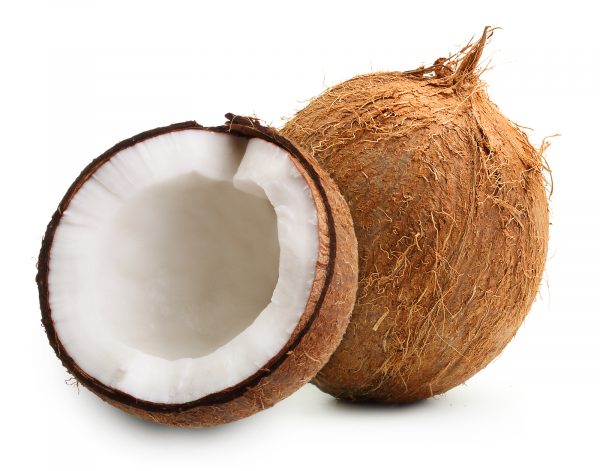
Coconut pulp is eaten fresh or in the form of shavings. Almonds in excessive quantities can be hazardous to health; they should be consumed in doses
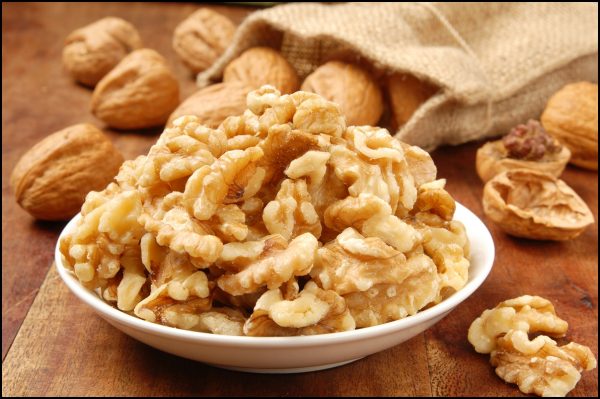
Walnuts enrich breast milk and make it more nutritious
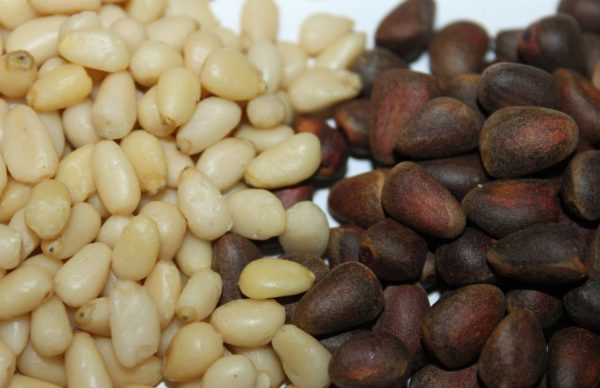
Pine nuts are considered the safest and least allergenic compared to other varieties
Feedback from nursing mothers
I crack and eat pine nuts almost every day. I bought it while B was out and didn’t have time to eat it all. I kept looking at them - I really like them..)) I decided to try it and everything is OK, now I click them often..)))
Elena
https://www.babyblog.ru/user/puzik-karapyzik/3000509
no more than 4 walnuts per day. In the maternity hospital they recommended not to indulge in nuts, as they are harmful to the baby’s liver. But in small quantities, nuts increase lactation
Olga Belyaeva
https://www.baby.ru/blogs/post/15857565–4145884/
You need to eat any nuts! There will be a good flow of milk + very fatty. Doctors especially recommend walnuts, but I ate more almonds
Katerina I Love Lera Much
https://www.baby.ru/blogs/post/380212183–195508981/
Can a nursing mother eat?
Many mothers ask pediatricians whether they can eat nuts while breastfeeding in the first month. This product is nutritious, contains many valuable substances, and gives energy.
After childbirth, a woman’s body is exhausted and weakened and needs vitamins and minerals for faster recovery. But nuts cannot be called the best choice in the first months after the birth of the baby.
It must be remembered that elements of the food that a mother eats are passed on to her baby through breast milk. Nuts have highly allergenic properties due to the content of essential oils. They are also difficult to digest and digest by the baby’s body.
The digestive and immune systems of a newborn are not yet fully formed, so the likelihood of the baby developing allergies, indigestion, diarrhea, constipation and other problems after a nursing mother eats nuts is very high.
A woman should include this product in her diet several months after giving birth. If it is correctly introduced into the menu and consumed in moderation, it will only benefit the mother and her child.
Nuts contain large amounts of vitamins and minerals. The composition of the product depends on the variety. Nuts help restore the mother’s body after childbirth and ensure normal growth and development of the baby.
They improve the functioning of nerve cells, organs and systems, increase concentration, stimulate brain function, and strengthen the immune system.
Nuts and their benefits: studying the facts
Nuts are necessary and important. But why? What are their benefits for the baby and mother?
Nuts contain the maximum amount of vitamins, minerals, micro- and macroelements. Based on their natural rich material composition, their kernels are the first product for the preparation of medicines that boost immunity, as well as the main component for medicinal tinctures and ointments.
- Nuts contain a huge amount of vitamin C, the role and significance of which for a child’s body cannot be described in words. Its content in nuts is several times higher than, for example, in lemon or currants.
It is important to know
The younger the kernel, the higher the vitamin C content. Ripe nuts contain much less vitamin C.
- Plant proteins consisting of twenty vital and essential amino acids.
- Polyunsaturated fats.
- Juglone is an important antibacterial compound that protects both mother and child from colds and viral diseases.
- Tannins
- Micro- and macroelements: iodine and magnesium, potassium, zinc.
- Vitamins: mainly group B, as well as vitamins A, E, PP.
- Iron, of which there is a sufficient amount in the nut kernel, is easily absorbed by the child's body.
- Carotenoids.
- Essential oil.
Useful: Temperature during breastfeeding - can you breastfeed or not?
Nuts are undoubtedly a healthy product, but very high in calories. A third of its kilocalories comes from fat. The delicacy contains practically no carbohydrates, so a nursing mother should not worry that consuming them may change her body parameters. When breastfeeding, nuts are a must. Their main advantage is the ability to enrich milk with protein substances, amino acids important for growth and development, and beneficial unsaturated fatty carboxylic acids.
But there are other reasons why you should not give up eating nuts.
- Nuts have a sedative effect. They calm the baby's nervous system and have a beneficial effect on sleep.
- Improves the performance of the heart muscle.
- Strengthen the immune system.
- Protect from the effects of negative factors, such as radiation.
- They have a diuretic effect. If after childbirth your swelling does not go away, you can eat nuts, they will definitely help.
- Remove toxins.
- Enrich the body with oxygen. Women with postpartum anemia simply need to include nuts in their diet.
- Relieve fatigue and prevent depression.
- Improves brain function, improves memory.
- They are actively fighting mastopathy.
The conclusion suggests itself is the following: nuts are an important food product in the menu of a nursing mother, and the answer to the question “can I eat nuts during lactation?” obvious. It’s not just possible, but necessary.
There is a legend according to which the nut is a product that increases lactation. Why legend? Yes, because from a scientific point of view there is no evidence for this theory. Lactation is not increased, but the fat content of milk is increased. This is a fact, and you can't argue with it. And increased lactation when consuming kernels is more of a placebo effect, that is, self-hypnosis, a so-called psychological trick.
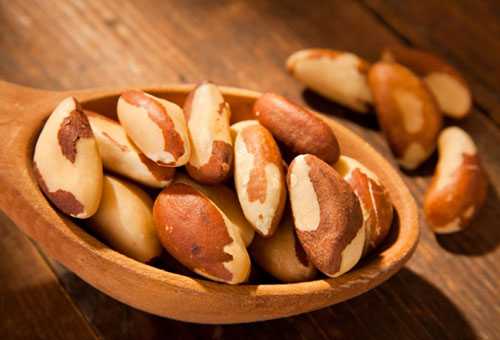
What about allergies?
Undoubtedly, all types of nuts are allergenic foods. But it is worth noting that cedar kernels are a less allergenic product than, for example, walnut or pistachio kernels. However, a nursing mother should be careful when introducing pine nuts into her diet.
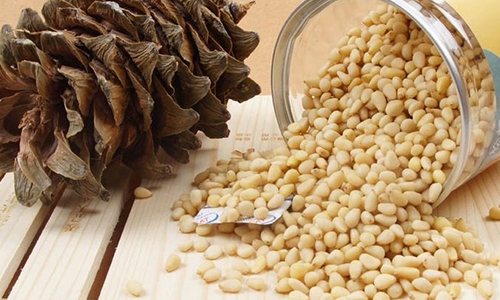
Most often, this product causes gastrointestinal disorders in the child, such as colic, bloating, constipation. But, in rare cases, symptoms of an allergic reaction may appear - a rash on the baby’s skin, redness. If these symptoms occur, the young mother will have to give up pine nut kernels for a while.
Nuts during lactation: general contraindications
Along with a lot of advantages, this product has some restrictions for use during feeding of a newborn.
Useful: Methods and rules for expressing breast milk
Nuts occupy third position in the ranking of products that are strong allergens. Allergic reactions that may occur on a baby’s body do not depend on the mother’s individual predisposition to a given food product. Miracle kernels can be safe for the mother, but dangerous for the baby.
Advice
Start eating nuts in small quantities. You can try one nut to understand how the baby’s body will react to the innovation.
- If you find any allergic reactions in your child, such as rash, stomach cramps, upset or constipation, general psychological anxiety, then the nut is not your product and should be urgently excluded from the diet.
- Allergic reactions may develop after some time. This happens in cases where the mother abuses the treat.
Medical contraindications
The lactation period does not allow the consumption of nut kernels if:
- there is individual intolerance;
- spasm of blood vessels in the brain occurs;
- There are skin diseases such as psoriasis, neurodermatitis, eczema of various natures.
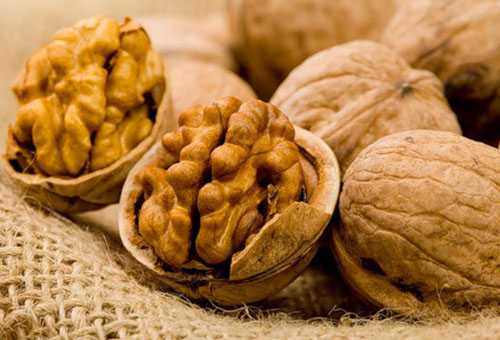
Storage rules
When buying pine nuts, choose an unshelled product. The shell protects the kernels from the adverse effects of the environment. Peeled cedar grains quickly deteriorate and lose their beneficial properties.
Unshelled pine nuts are stored in the refrigerator or freezer. In the first case, the shelf life of the nucleoli will be 3 months, in the second – 6 months. Unshelled nuts can be stored for up to a year at room temperature. You cannot use nuts that have expired. They can cause digestive upset and intoxication of the body.
When feeding a child, any product is introduced into the mother's diet gradually. To begin with, it is enough to eat a few nucleoli in the morning, and then see how the baby’s body reacts to this innovation. It is advisable to monitor the baby for up to two days, and only then can you increase the amount of food eaten.
You can simply chew nuts like seeds, but it’s better to add them to salads and dishes. In combination with herbs and vegetables, they give food an exquisite buttery taste, and it’s also easier not to overdo it with quantity. You need to be careful when handling natural nut paste - urbech made from ground cedar seeds. It’s easy to overeat it and cause indigestion or allergies in your baby.
A separate issue is the choice of a quality product. It is ideal to buy fresh crops that have recently been harvested and dried. Otherwise, there is a risk of getting nuts - “dummies”. After a fairly short time, they lose most of their benefits, and then, apart from a large amount of calories and fat, they do not provide anything to the body of a nursing mother.
Purified kernels can last no more than 3 months in the refrigerator and up to six months at -18°C. At the same time, they are stored in sealed containers: plastic bags, closed containers or glass jars. The fact is that cedar oil strongly oxidizes and goes rancid when exposed to air. As a result, the treat acquires an unpleasant taste and smell and, moreover, can cause poisoning.
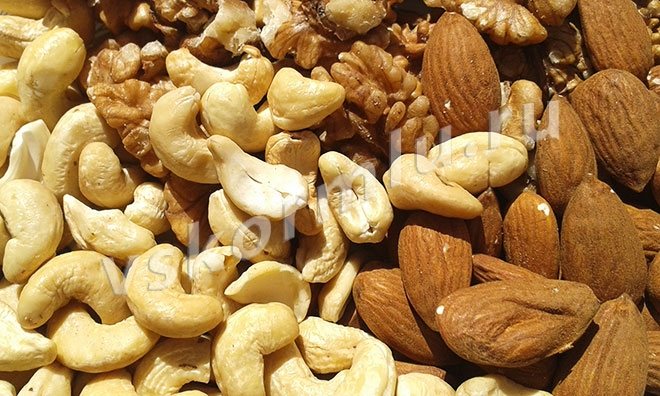
Thus, pine nuts during breastfeeding are not able to affect lactation, but bring invaluable help to the female body. However, it is worth remembering that kernels are allowed in limited quantities and not to get carried away, even though it is difficult. Particular attention is paid to the quality of the product. Do not take peeled kernels sold by weight in stores. They come into contact with air and oxidize, and are also likely to become contaminated. It is better to buy them in sealed packages or in shells.
During lactation
Worries about whether pine nuts can be eaten during breastfeeding are completely in vain.
Doctors do not easily recommend, but insist that you should give preference to them.
The combination of high utility and safety even for a newborn makes this product an absolute champion.
Read also: Is it possible to drink coffee with milk while breastfeeding (BF)
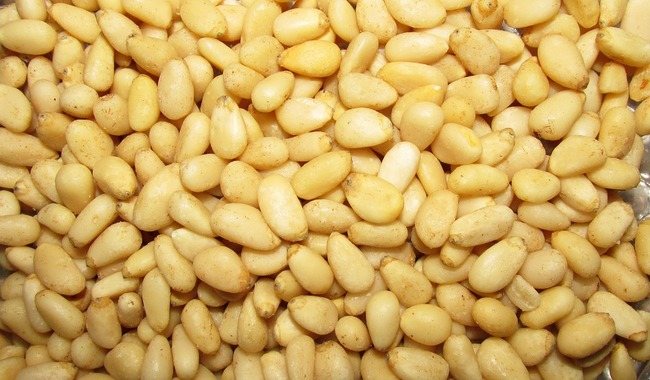
Among the positive impacts it is worth mentioning:
- Protection against the penetration of viruses from the outside.
- Keeping your immune system in shape.
- Acceleration of skin regeneration. Skin and nails also take on a healthy and well-groomed appearance.
- Beneficial effect on vision.
How to include in your diet
Start with one core, carefully noticing any reactions from the baby. If everything goes well, there is no redness, intestinal disorders, etc., this does not yet give the green light. Why? Side effects can be cumulative, appearing after two days or a week. Stick to eating only one thing for at least a month. And only then increase it to three, but no more.
When taken regularly, nuts can improve heart function and memory, increase stamina and improve metabolism. Don't forget that moderation is important in everything, even in such a wonderful product.
Follow this algorithm when breastfeeding when starting to eat pine nuts:
- Only 3 months after birth.
- Introduce gradually.
- Monitor the baby's reactions.
- Do not add other allergens at the same time.
- Consumption is prohibited for inflammation and kidney stones.
- No more than thirty grams per day.
- Only raw or dried foods are allowed, and never fried. During heat treatment, there is a loss of usefulness.
Pay attention to the fact that kernels in stores are often already peeled. Manufacturers do not always follow storage standards; this can lead to spoiled taste and bitterness.
To avoid risk, buy fruits in shells.
Store exclusively in the refrigerator for no more than three months. But in the freezer the shelf life doubles. The main thing is not to keep them in the light or at room temperature.
Rules for introduction into the diet and norms of consumption
During lactation, it is important for a woman to introduce nuts into her diet correctly and not to overuse them. This will help reduce the likelihood of unwanted reactions and also allow you to get the maximum benefit from the product.
Rules for introducing nuts into the menu during lactation:
- Include the product in your diet gradually and carefully. It is important to do a food test. To do this, a woman needs to eat one fruit in the morning, and then monitor the baby for two days;
- in the absence of negative reactions, you can increase the daily portion of the product within a week to the standard level;
- If the baby has unpleasant symptoms, then you should give up nuts for at least 3-4 weeks.
Experts give the following recommendations to nursing mothers:
- Nuts should be introduced into the diet when the child feels well and has no signs of allergies, poisoning, or disorders of the stomach and intestines;
- You should not include several types of nuts in your diet at the same time. Then it will be difficult to understand which type of product is poorly tolerated by the baby’s body;
- if a baby suffers from colic or is prone to allergies, then it is better to hold off on including nuts in a woman’s diet;
- It is worth discarding the product if there are pathologies of the digestive tract.
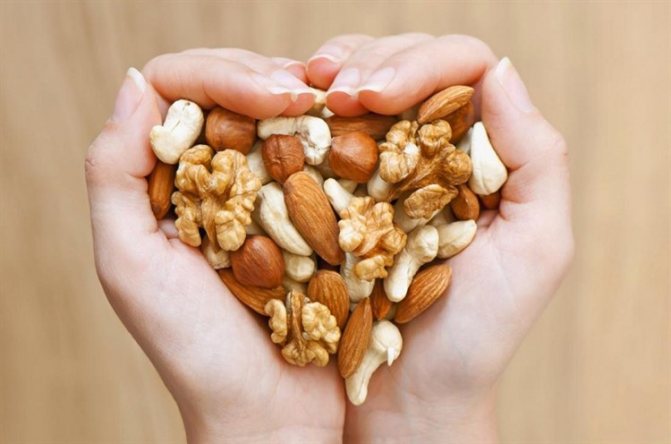
Fresh nuts are the best choice for a nursing mother
The norm of nuts for nursing women is 20-30 grams per day. It is better to consume the product dried or fresh. Fried kernels are more difficult to digest and can harm the health of the mother and her baby. You should not buy salty, sweet, glazed products.
Nuts can be consumed with honey and dried fruits. This dessert will saturate the body with useful substances and give a boost of energy for the day.
Is it possible to overdose when eating nuts?
No matter how strange it may sound, but when consuming pine nuts, you can encounter an overdose of this product. Nuts are a compulsive delicacy. When we are about to eat a few kernels, we ourselves may not notice how we eat a handful or two. Many people believe that nothing bad can happen from eating a large number of nut kernels. But that's not true.
Symptoms of an overdose do not appear immediately, but after some time - from a day to two to three days. The main symptom will be bitterness in the mouth. Its intensity depends on the degree of overdose - from mild to unbearable. Dry mouth, nausea, drowsiness, and dizziness may also be present. Such symptoms develop against the background of the choleretic effect of cedar kernels.
To neutralize the negative effects of pine nuts on the body, it is recommended to take the sorbent and avoid coffee, spicy and fatty foods for several days. Along with the sorbent, you can drink green leaf tea. It has the property of removing harmful substances and toxins from the body.
A woman and her baby may experience various negative reactions after eating nuts. The likelihood of unwanted symptoms increases if you include this product in your diet if there are contraindications.
During lactation, a woman is prohibited from eating nuts in the following cases:
- the presence of skin pathologies (neurodermatitis, psoriasis, eczema of any etiology);
- spasm of cerebral vessels;
- individual hypersensitivity;
- inflammation of the stomach or intestines;
- pancreatitis;
- violation of fat metabolism;
- enzyme deficiency;
- cholecystitis;
- excess body weight;
- cholelithiasis.
The following negative reactions may occur in infants to nuts:
- allergy. Expressed in a rash, the appearance of red spots on the body, hyperthermia, swelling;
- poisoning. Possibly when a woman abuses nuts or in the case of using spoiled fruits. Manifested by high fever, body aches, headache, vomiting, diarrhea;
- disorder in the digestive tract. Possible if a woman eats nuts in the first months after childbirth. Expressed in bloating, flatulence, colic, loss of appetite, vomiting, diarrhea or constipation.
If the reactions described above occur in a baby, a nursing woman should stop further eating nuts and seek help from a pediatrician.
Effect on lactation
The common belief that pine nut kernels can stimulate breast milk production is incorrect. Experts have no evidence on this matter.
But this product affects the quality characteristics of mother's milk. It saturates it, makes it thicker and more nutritious. This property is especially useful for those mothers whose babies suffer from underweight. In this case, pine nut kernels help the child gain the missing kilograms and nourish the body’s cells with useful substances.
If the newborn is not allergic to any particular type of nut, it can be added to various dishes. Since nuts have a positive effect on the composition of milk and significantly enhance lactation, several special recipes have been developed that provide a positive effect.
To increase the nutritional value of human milk, a special infusion is prepared. Walnuts (1-2 kernels) are thoroughly crushed and added to 100 ml of boiled milk. The composition is poured into a thermos and left for 2-3 hours. Take warm during the day. Mom should remember that the “healing” drink contains 2 powerful allergens: nuts and milk, so before taking the mixture you should make sure there is no reaction.
Nuts are a storehouse of vitamins and microelements, and their proper consumption during lactation can only bring benefits. Compliance with all prescribed rules will allow you to acquire useful qualities without harming the health of the newborn.
conclusions
Pine nuts during breastfeeding saturate the body of mother and child with useful substances and vitamins. The main thing is to follow the rules for their use:
- introduce into the diet no earlier than three months after birth;
- first use – several nucleoli;
- maximum portion per day – 30 grams;
- eat infrequently, once or twice a week;
- do not eat damaged or old nuts;
- take into account contraindications.
Follow these recommendations, and your baby will receive invaluable benefits from mother's use of this product. Pine nuts will help nursing mothers restore strength, strengthen the immune system and improve the taste and quality of breast milk.
Dear blog visitors, leave your reviews and opinions on how beneficial pine nuts are during lactation. Share the link to the article with your friends on social networks, let them also speak about the benefits and harms of cedar kernels during breastfeeding.
Pine nuts
Cedar seed kernels have long been famous for their healing properties and nutritional value. 100 g of product contains 673 kcal. Pine seeds are rich in three types of fatty acids, including the most valuable and deficient Omega-3. Omega-3 acid supplies the baby with building material for the development of vision and brain. It helps strengthen children's immunity, reduces the likelihood of diathesis and promotes dental development.
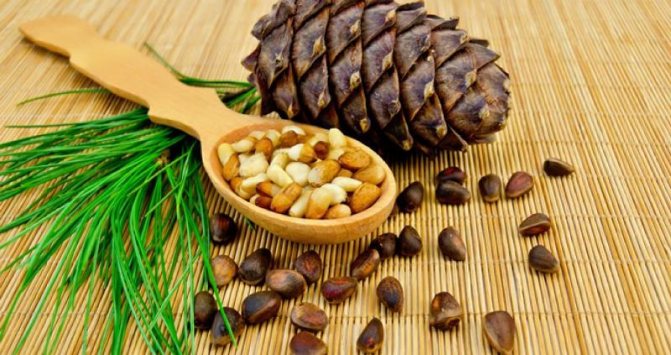
Pine nuts during breastfeeding will help saturate the baby's body with amino acids. Most amino acids are essential and are present in the product in ideal proportions. Among them are rare amino acids: lysine, methionine, tryptophan and arginine. They are necessary for the full development of the newborn. Nuts are rich in vitamins A, B, E, C and K. The components of pine seeds almost completely satisfy the body's need for minerals. They contain phosphorus, magnesium, potassium, sodium, calcium, iron, manganese, zinc, molybdenum, silicon, aluminum, iodine and boron.
